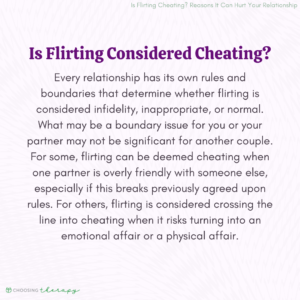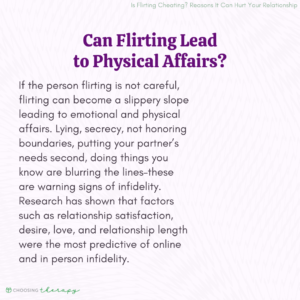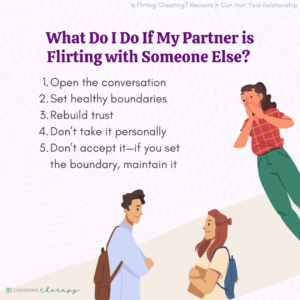Whether flirting is considered cheating in a relationship depends on how both people feel about flirting and what the intent of the flirting is. Flirting that crosses either person’s relationship boundaries repeatedly can negatively affect the couple in many ways. However, flirting doesn’t always equal cheating, so it is important to assess each situation individually.
Are trust issues hurting your relationship? ReGain specializes in helping individuals and couples repair their relationships. Complete a brief questionnaire to be matched with a therapist. Start online counseling for as little as $65 per week.
Is Flirting Considered Cheating?
Every relationship has its own rules and boundaries that determine whether flirting is considered infidelity, inappropriate, or normal. What may be a boundary issue for you or your partner may not be significant for another couple. For some, flirting can be deemed cheating when one partner is overly friendly with someone else, especially if this breaks previously agreed upon rules. For others, flirting is considered crossing the line into cheating when it risks turning into a physical or emotional affair.
In addition, the unfaithful partner’s intent often determines the difference between innocent and purposeful flirting. For example, why are they expressing affection? Is their intent to gain more intimacy or sexual interest? How do the people involved feel about their behaviors? While flirting may start off as something innocuous, it could become something much bigger and more destructive towards the relationship.
Below are examples of how flirting can cross the line into cheating.
Physical Touch
Not all physical touch is indicative of flirty or sexual intent. However, if someone is especially and/or consistently touchy with another person, it can indicate a different level of interest–especially if there is an existing level of attraction from either party.1 Some examples of using physical touch to flirt include touching a person’s leg, putting their hand on the small of their back, or touching their arm to flirt.
Suggestive Messages
It’s nice to congratulate someone on an achievement or joke back and forth, but when someone in a relationship compliments someone who isn’t their partner on their attractiveness or what they are wearing, it can indicate a different type of interest. People may add something like “lol” or an emoji to make it less flirtatious or play it off as a joke if they believe the message is crossing the line, but it doesn’t take back the original message, which may cross the line into sexting and cheating. Suggestive messages can also be sent on social media to strangers, mainly influencers, which is one of the ways social media affects relationships.
Secrecy
When the flirting happens in secret or causes the person to lie, it can cross the line into infidelity. If someone’s partner is protective of their devices, lies to their partner about where they are and whom they are with, deletes messages on social media, or withholds any information from their partner about the flirting, this is not only a breach of trust, but it can also cross the line into cheating.
Your Partner Comes Second
When a person starts to put their partner second to the other person whom they are flirting with, this can result in their partner feeling neglected and ignored, and may cause further strain on the relationship. For example, if someone flirts with someone at work often, they may take on another project to be close to this person or make excuses to stay late at the office. If someone flirts with multiple people, it is possible that their relationship comes second to their own need for attention and validation.
You Rationalize Your Behavior
Saying things like “they’re just a friend” or “well, my boyfriend hasn’t complimented me in weeks” may indicate a pattern of rationalizing inappropriate behavior. If people find themselves feeling guilt or shame over this relationship or need to rationalize it, they may benefit from taking another look at the situation.
Recovering From Infidelity Or A Betrayal Of Trust
Individual Therapy – Whether you’re trying to move on or rebuild a relationship, a licensed therapist from BetterHelp can guide you. BetterHelp has over 20,000 licensed therapists who provide convenient and affordable online therapy. Visit BetterHelp
Couples & Marriage Counseling – Talkspace offers you and your partner the support and structure you need. It’s private, convenient, and affordable. Learn More
OurRelationship (Free Couples Course) – OurRelationship has been proven to help couples improve communication, intimacy, and trust. 94% would recommend it to a friend. Get Started
Can Flirting Be Innocent?
Flirting can indeed be innocent when it does not violate previously established relationship rules and boundaries. In fact, some couples actually benefit from giving each other the space to flirt with others outside of the relationship. Sometimes flirting can offer the relationship something novel and exciting–when it’s agreed upon.
Can Flirting Lead to Physical Affairs?
If the person flirting is not careful, flirting can become a slippery slope leading to emotional and physical affairs. Lying, secrecy, not honoring boundaries, putting your partner’s needs second, doing things you know are blurring the lines–these are warning signs of infidelity. Research has shown that factors such as relationship satisfaction, desire, love, and relationship length were the most predictive of online and in person infidelity.2
When Can Flirting Hurt Your Relationship?
Flirting with others can hurt your relationship if it remains a constant issue, as it erodes the trust and respect you and your partner have for each other. Emotional affairs, online infidelity, and micro cheating (for example, lying about your status on social media, “liking” provocative posts, or reaching out to someone else for support when you are experiencing relationship issues) can hurt just as much as physical and/or sexual infidelity. In some of these cases, the person starts to share more intimate details of their life, finds ways to see or speak to this person, and makes inappropriate comparisons to their current partner.3
Below are seven ways flirting can hurt your relationship:
- Creates trust issues: When a person flirts with others outside of the relationship, it begins to erode the trust in the relationship, putting cracks in the foundation. This is especially true when there is a conscious violation of the relationship’s boundaries.
- Resentment: It is common for resentment to grow in a relationship when issues are not addressed, or they have been addressed and nothing has changed. For example, if a person continuously communicates that their partner’s flirting affects them but nothing changes, resentment in their partner will continue to grow.
- Boundary issues: Setting and maintaining healthy boundaries in relationships is critical to building lasting trust and respect. When a person crosses or refuses to honor a boundary, it often damages the relationship by making the person feel disrespected and unappreciated.
- Low self-esteem: When someone is continually flirting with other people outside of their relationship, it could affect their partner’s self-esteem and make them uncomfortable, which can lead to issues such as depression and anxiety.
- Increased risk of infidelity: There is a risk that flirting can become something bigger and more destructive, leading some to stray and commit emotional or physical infidelity.
- It can destroy your relationship. Ultimately, continued flirting that oversteps your relationship’s boundaries can destroy your partnership. It can be an example of a behavior that undermines the trust, respect, and safety in the relationship.
- Creates intimacy issues with your partner: Flirting with others can feel like an escape from reality, in which kids, bills, life, and work stress put additional strain on relationships. When a person continues to engage in this type of behavior, they may feel more drawn or attracted to more carefree interactions and individuals, which can create intimacy issues with their partner if they fail to provide a similar escape.
What To I Do If My Partner is Flirting with Someone Else?
If you notice your partner flirting with someone else, you may feel a range of emotions; you may find that it doesn’t bother you, but it is common to feel sad, confused, frustrated, and worried that your partner is cheating. You may feel there is nothing you can do, but that is not true. There are several steps you can take to move forward, whether you choose to work through the issue and stay in the relationship or part ways.
Some important steps to take if flirting becomes an issue in your relationship include:
Open the Conversation
If your partner’s flirting is bothering you, it is important that you speak up, especially if it happens on more than one occasion. However, it is important that both people approach the conversation in a calm, respectful manner and remain dedicated to hearing each other out–even when the subjects become unpleasant.
Some techniques to have a productive, healthy conversation about flirting include:
- Create a structured conversation
- Learn how to fight fair so you can learn how to change your communication patterns
- Use ‘I’ statements that express how you feel without blaming (i.e., “I feel hurt that you continue to flirt with other people even though I’ve mentioned it makes me feel insecure.”)
- Schedule alone time
- Approach the conversation while in a good emotional space
- Discuss only one topic (in this case, how the flirting makes you feel)
- Take turns “having the floor” where one of you speaks and the other cannot interrupt
- Manage your emotions and take “time outs” if necessary
- Agree on the length of time prior to the conversation and set a timer
- Watch your tone and inflection
Set Healthy Boundaries
Setting healthy boundaries around flirting and fidelity early on in a relationship can help you avoid situations where the line between innocent behavior and infidelity blur. Discuss with your partner how each of you feel about flirting — when is it okay, when does it cross a line, what’s the intention behind the flirting, and so on.
If your partner flirts with other people after you have set these boundaries, you should feel comfortable enforcing them. This can look like telling the person that what they are doing is hurtful and intolerable while bringing up the previously agreed upon rules around flirting and how this negatively affects the relationship. Boundaries can and should be reevaluated and renegotiated if situations come up that make either partner uncomfortable.
Rebuild Trust
If you and your partner are interested in staying together, take the steps to rebuild trust in the relationship. You should start to do this – sooner rather than later – by engaging in healthy conversations that allow both people to talk about their feelings. Conversations should also address the reason(s) behind the flirting, setting healthy boundaries, and building a safer space. It may not happen overnight, but trust can be rebuilt and re-earned.
Don’t Take It Personally
If and when the flirting crosses a boundary, it is often the flirting partner’s fault, so make sure you leave any self-blame you may be feeling at the door. It is easy to blame ourselves for our partner’s inappropriate behavior–or even infidelity–by saying things like, “If I was more fun, he wouldn’t be flirting with his coworker,” or “If I worked fewer hours and spent more time with her, she wouldn’t be sending flirty messages on Instagram.” However, remember that your partner made a choice to betray your trust and disrespect your boundaries, which was entirely avoidable. This will allow the person to take responsibility for their issues.
Don’t Accept It—If You Set the Boundary, Maintain It
Have a conversation with your partner about their flirting and how harmful it is for the relationship. Seek to listen and understand their motives, as they can help you work on your relationship. However, even if you listen and understand, it doesn’t mean you have to accept it. If they crossed a boundary, you have the right to remain upset.
When To Seek Professional Help
Many people–both individually and as couples–attempt to work on relationship issues without professional help, but this can be challenging. If you find yourself in that situation, it might be time to seek individual and/or marriage & couples therapy. A relationship professional provides a safe platform where an individual or couple can discuss any issues affecting your partnership and can help you develop more effective coping skills.
Many therapists offer both in-person and online couples counseling services. You can find the right couples counselor by browsing an online therapist directory that allows you to look at a therapist’s areas of expertise and filter by factors such as gender, location, and insurance.
Final Thoughts
Ultimately, each couple determines whether or not flirting is considered cheating in their relationship. Each couple has their own rules and boundaries, thus, reinforcing and honoring the rules of your relationship is most important. Issues with inappropriate flirting in relationships can take a mental and emotional toll on the couple and create problems with trust and self-esteem. Despite those factors, there are many ways to have healthy conversations about–and move forward from–the problem of flirting and infidelity in a relationship.
Additional Resources
To help our readers take the next step in their mental health journey, Choosing Therapy has partnered with leaders in mental health and wellness. Choosing Therapy is compensated for marketing by the companies included below.
BetterHelp (Online Therapy) – Whether you’re feeling uneasy in your relationship, trying to rebuild trust, or working on forgiveness – a licensed therapist from BetterHelp can guide you. BetterHelp will ask you about the things you want to work on and what you’re looking for in a therapist. Visit BetterHelp
Talkspace (Counseling For Overcoming Adultery) – Talkspace offers you and your partner the support and structure you need. It’s private, convenient, and affordable. Get Started
OurRelationship (Free Couples Course) – OurRelationship has been proven to help couples improve communication, intimacy, and trust. 94% would recommend it to a friend. Get Started
Relationship Newsletter (Free From Choosing Therapy) – A newsletter for those interested in improving relationships. Get helpful tips and the latest information. Sign Up
Best Online Marriage & Couples Therapy Options Marriage and couples therapy can be helpful and a worthwhile investment for couples who want to seek help with their relationship. Which online platform will work best for you will depend on what issues you want to work on, what your goals are for your relationship, the cost, and if it’s available in your state. OurRelationship - Free Relationship Course Are Your Relationship Doubts a Symptom of Relationship OCD or a Wrong Relationship? Have you ever wondered to yourself, “What if I’m not in love with my partner anymore? What if I’ve never been?” For some people, these thoughts are more than occasional. They can become constant and overwhelming, and even lead to compulsive actions like seeking reassurance to quiet them. When these thoughts and actions rise to the level of obsessive-compulsive order (OCD), they are known as relationship OCD, or ROCD.










